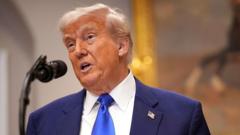European policymakers are navigating the challenges presented by recent U.S. tariffs that threaten to escalate into a full-blown trade war, with potential economic repercussions for the continent.
**Europe Braces for Trade War Amid Trump Tariffs: Strategies and Consequences**

**Europe Braces for Trade War Amid Trump Tariffs: Strategies and Consequences**
As Europe faces the prospect of a sweeping 20% U.S. tariff, leaders prepare responses while seeking negotiations.
In a surprising move, the United States under President Donald Trump has announced sweeping 20% tariffs on various imported goods from Europe, causing outrage among European leaders. French Prime Minister François Bayrou labeled the tariffs a "catastrophe for the economic world," while European Commission President Ursula von der Leyen expressed concern over the dire consequences for millions globally. Amidst this rapidly evolving situation, Europe gears up to negotiate, but it also prepares countermeasures should talks fail.
EU Trade Commissioner Maros Sefcovic has emphasized a need for a measured and phased response, indicating discussions with U.S. officials scheduled for Friday. The anticipation of a trade war has prompted national governments to act quickly to mitigate fears within industries impacted by potential losses, particularly in countries like Italy and Spain, which have substantial export relationships with the U.S.
Italian Prime Minister Giorgia Meloni called for an urgent meeting with ministers and business leaders after acknowledging the real threat presented by Trump's tariffs. Agricultural exports, which hold significant value for Italy, face the greatest risk. Spain's Prime Minister Pedro Sánchez refuted Trump's misleading claims regarding existing EU tariffs, emphasizing the need for collective European action against protectionism.
Concerns for economic stability are widespread, with Slovakia, Poland, and France's industries being particularly vulnerable. Analysts predict severe economic downturns for countries heavily reliant on exports like Slovakia, while the French wine sector faces potential losses upwards of €1 billion due to reduced sales in the U.S.
Investor sentiment across Europe has turned negative, with large multinationals like Adidas experiencing drastic declines in stock value. Smaller businesses, including family-run companies, could face dire consequences as they adapt to the evolving trade landscape. Rocco Mangiaracina, who recently began exporting olive oil to the U.S., finds himself directly impacted by these tariffs.
Germany's acting Chancellor Olaf Scholz pointed to the strength of the EU's internal market, emphasizing the importance of unity in response to Trump's tariffs. In the face of potential retaliation, the EU has proposed a first package of tariffs worth up to €26 billion on U.S. goods that may be implemented by mid-April, as a decisive counter to American trade actions.
While the political landscape remains complex, European nations seek to balance negotiations with strategic responses to protect their economic interests. As tensions rise, the outcome of these trade disputes could set the stage for profound shifts in global trade dynamics, highlighting the interconnectedness of international commerce and the urgency to arrive at a resolution.





















